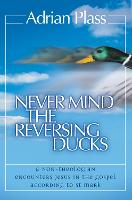


|
|
| book details |
Never Mind the Reversing Ducks: A Non-Theologian Encounters Jesus in the Gospel According to St Mark
By (author) Adrian Plass

|
| on special |
normal price: R 227.95
Price: R 215.95
|
| book description |
‘It’s interesting to note that the original Greek word used here has a very strong sense of waterfowl flying backwards. So, what the writer is saying is that they went down like reversing ducks, and so, of course should we …’– from Adrian Plass’s popular spoof of an Anglican sermonReaders who seek a weighty theological treatise on the life of Christ will not find it in these pages. With a deft touch and down-to-earth humour, Adrian Plass offers a heartfelt response to the life and ministry of Jesus as presented in the Gospel of Mark.‘I have had a passion for Jesus for many years,’ says Plass. ‘In Jesus we meet a dynamic, hardworking, passionate member of the human race, a man, but a man who was also God. Stronger than all the powers of nature, he was nevertheless willing to become a servant so that people like you and I can be rescued from the worst of disasters.’Plass brings his own unique perspective to this meditation on Mark, which has been broken into ninety sections that can be read in any order or continuously. An adventurous, challenging, witty and often poignant look at the events in the life of Jesus, Never Mind the Reversing Ducks addresses the deep issues we all face.
| product details |

Normally shipped |
Publisher | Zondervan
Published date | 25 Sep 2003
Language |
Format | Paperback / softback
Pages | 240
Dimensions | 202 x 133 x 22mm (L x W x H)
Weight | 199g
ISBN | 978-0-0071-3044-3
Readership Age |
BISAC | religion / bible / meditations / general
| other options |

Normally shipped |
Readership Age |
Normal Price | R 519.95
Price | R 493.95
| on special |
|
|
|
To view the items in your trolley please sign in.
| sign in |
|
|
|
| specials |
|

|
Mason Coile
Paperback / softback
224 pages
was: R 520.95
now: R 468.95
|
A terrifying locked-room mystery set in a remote outpost on Mars.
|
An epic love story with the pulse of a thriller that asks: what would you risk for a second chance at first love?
|
|
|
|
|
|